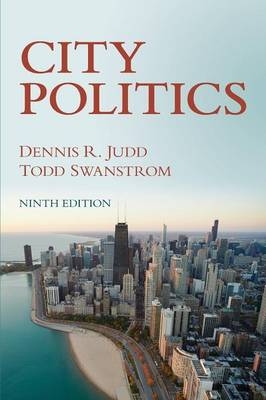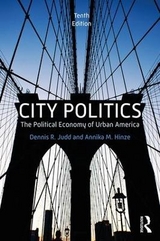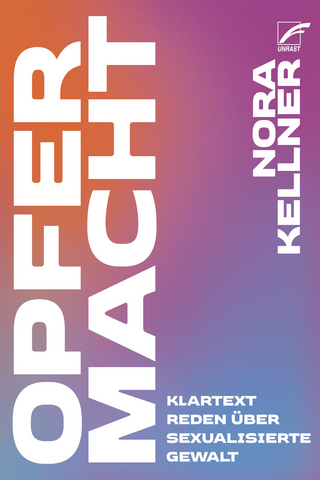
City Politics
Routledge (Verlag)
978-0-205-99639-1 (ISBN)
- Titel erscheint in neuer Auflage
- Artikel merken
Praised for the clarity of its writing, careful research, and distinctive theme - that urban politics in the United States has evolved as a dynamic interaction among governmental power, private actors, and a politics of identity - City Politics remains a classic study of urban politics.
MySearchLab is a part of the Judd/Swanstrom program. Research and writing tools, including access to academic journals, help students understand critical thinking in even greater depth. To provide students with flexibility, students can download the eText to a tablet using the free Pearson eText app.
This title is available in a variety of formats – digital and print. Pearson offers its titles on the devices students love through Pearson’s MyLab products, CourseSmart, Amazon, and more.
Note:This is just the standalone book.
Dennis R. Judd is a professor in the Department of Political Science and Fellow in the Great Cities Institute, University of Illinois at Chicago. For many years he has been a major contributor to the literature on urban economic development, national urban policy, and urban regeneration in Europe and the United States; two books from this research program include Regenerating the Cities: The UK Crisis and the US Experience (co-edited with Michael Parkinson and Bernard Foley; Manchester University Press, 1988), and Leadership and Urban Regeneration: Cities in North America and Europe (co-edited with Michael Parkinson; Sage, 1990). He is co-author of a leading textbook in the field of urban politics, City Politics (8th edition, Longman, 2011), and served as editor of the leading journal in urban affairs, the Urban Affairs Review, from 1985 to 2002. More recently he has been engaged in a sustained research program on tourism as an instrument for urban revitalization; publications include The Tourist City (co-edited with Susan Fainstein; Yale University Press, 1999), The Infrastructure of Play (edited; M.E. Sharpe, 2003), and Cities and Visitors (co-edited with Susan Fainstein and Lily Hoffman; Blackwell, 2004). His most recent book is The City, Revisited (co-edited with Dick Simpson). Currently he is working a book examining the tourist strategy to revitalize Chicago’s lakefront, and is leading a collaborative project on the policy problems of the Great Basin Desert in the American West. In 1997 he received the Chancellor’s Award for Excellence at the University of Missouri-St. Louis, and in 1998 he received the Career Achievement Award from the Urban Politics Section of the American Political Science Association. In 2013 the Urban Politics Section of the American Political Science Association honored him by naming its annual best book award the Dennis Judd Best Book Award in Urban Politics. Todd R. Swanstrom has a Masters from Washington University in Political Science and a Ph.D. from Princeton University in Politics. The author or co-author of six books and over twenty-five scholarly articles, Professor Swanstrom also served as a neighborhood planner for the City of Cleveland and as Staff Director of Strategic Planning for the City of Albany. He is co-author of the prize-winning book, Place Matters: Metropolitics for the Twenty-first Century, rev. ed. (University Press of Kansas, 2005), which examines the relationship between urban decline and suburban sprawl. Recently, he has published articles on the prospects for alliances between central cities and distressed suburbs, economic segregation among municipalities, different ways of measuring poverty, and the development of a regional greenway in St. Louis. His current research focuses on metropolitan approaches to equity and theories of regional network governance. He is also doing research on the responses to foreclosures in six metropolitan areas and efforts to open up construction jobs to women and minorities. He is a member of the MacArthur Foundation's Building Resilient Regions Network which is working to build the field of regional studies and translate scholarly research for practitioners.
In This Section:
I) Brief Table of Contents
II) Detailed Table of Contents
I) Brief Table of Contents
Chapter 1. City Politics in America: An Introduction
PART I: THE ORIGINS OF AMERICAN URBAN POLITICS: THE FIRST CENTURY
Chapter 2. The Enduring Legacy
Chapter 3. Party Machines and the Immigrants
Chapter 4. The Reform Crusades
Chapter 5. Urban Voters and the Rise of a National Democratic Majority
PART II: THE URBAN CRISIS OF THE TWENTIETH CENTURY
Chapter 6. The City/Suburban Divide
Chapter 7. National Policy and the City/Suburban Divide
Chapter 8. Federal Programs and the Divisive Politics of Race
CHAPTER 9. The Rise of the Sunbelt
PART III: THE FRACTURED METROPOLIS
Chapter 10. The Rise of the Fragmented Metropolis
Chapter 11. Governing the Fragmented Metropolis
Chapter 12. The Metropolitan Battleground
Chapter 13. The Renaissance of the Metropolitan Center
Chapter 14. Governing the Divided City
Chapter 15. City and Metropolis in the Global Era
II) Detailed Table of Contents
Chapter 1. City Politics in America: An Introduction
Three Themes
The Politics of Growth
The Politics of Governance
The Fragmented Metropolis
The Challenge of the Global Era
PART I: THE ORIGINS OF AMERICAN URBAN POLITICS: THE FIRST CENTURY
Chapter 2 The Enduring Legacy
National Development and the Cities
Outtake: City Building Has Always Required Public Efforts
A Century of Urban Growth
Interurban Rivalries
Industrialization and Community
The Immigrant Tide
The Capacity to Govern 3
The Limited Powers of Cities
Chapter 3 Party Machines and the Immigrants
Machines and Machine-Style Politics
Outtake: Machines Had Two Sides
The Origins of Machine Politics
Did Machines “Get The Job Done”?
Were Machines Vehicles of Upward Mobility?
Did the Machines Help Immigrants Assimilate?
The Social Reform Alternative
Ethnic Politics in Today’s Cities
Chapter 4 The Reform Crusades
The Reformers’ Aims
OUTTAKE: Municipal Reform Was Aimed at Immigrants
The Fertile Environment for Reform
The Campaigns Against Machine Rule 8
“Efficiency and Economy” in Municipal Affairs
The Business Model
Commission and Manager Government
Did Reform Kill the Machines?
The Reform Legacy
The Battles Continue
Chapter 5 Urban Voters and the Rise of a National Democratic Majority
City and Nation in the Twentieth Century
Outtake: Urban Ethnics Became a Mainstay of the Democratic Party
A New Political Consciousness
The Changing Political Balance
The Depression and the Cities
Cities Gain a Voice
The Urban Programs of the New Deal
The New Deal Legacy
PART II: THE URBAN CRISIS OF THE TWENTIETH CENTURY
Chapter 6 The City/Suburban Divide
A Century of Demographic Change
Outtake: Anti-Immigrant Passions Have Reached a Fever Pitch
Streams of Migration
Racial Conflict in the Postwar Era
The Emergence of a New Kind of Poverty
The Suburban Exodus
The Romantic Suburban Ideal: 1815Ð1918
The Automobile Suburbs: 1918Ð1945
The Bedroom Suburbs: 1946Ð1970s
The Rise of the Multiethnic Metropolis
Has the Urban Crisis Disappeared?
Chapter 7 National Policy and the City/Suburban Divide
The Unintended Consequences of National Policies
Outtake: Highway Programs Contributed to the Decline of the Cities
The Politics of Slum Clearance
How Local Politics Shaped Urban Renewal
Racial Segregation and “The Projects”
National Policy and Suburban Development
Suburbs, Highways, and the Automobile
The Damaging Effects of National Policies
Chapter 8 Federal Programs and the Divisive Politics of Race
The Brief Life of Inner-City Programs
Outtake: Racial Divisions Eventually Doomed Urban Programs
The Democrats and the Cities
The Republicans and the New Federalism
President Carter and the Democrats’ Last Hurrah
Republicans and the End of Federal Assistance
Political Reality and Urban Policy
The Cities’ Fall from Grace
The End of Urban Policy
CHAPTER 9 The Rise of the Sunbelt
A Historic Shift
Outtake: The Electoral College Favors the Sunbelt
The Concept of the Sunbelt xxxRegional Shifts
Why the Sunbelt Prospered
The New Politics of Sunbelt Cities
Regional Convergence and National Politics
PART III: THE FRACTURED METROPOLIS
Chapter 10 The Rise of the Fragmented Metropolis
Metropolitan Turf Wars
Outtake: There Is a Debate about Gated Communities
How the Suburbs Became Segregated
The Imperative of Racial Segregation
Walling Off the Suburbs: Incorporation
Walling Off the Suburbs: Zoning
The Challenge to Exclusionary Zoning
The New Face of Enclave Politics
Chapter 11 Governing the Fragmented Metropolis
The Problem of Regional Governance
Outtake: The Costs of Sprawl Are Hotly Debated
The New Urban Form
The Concerns about Sprawl
A History of Metropolitan Reform
The New Regionalism
Smart Growth
The New Urbanism
The Prospect for Reform
Chapter 12 The Metropolitan Battleground
The Competition for Fiscal Resources
Outtake: Hundreds of Little Hoovers Make the Economic Crisis Worse
Cities in the U.S. Federal System
Where the Money Goes
Where the Money Comes From
The Municipal Bond Market
The Rise of Special Authorities
Fiscal Gamesmanship
Chapter 13 The Renaissance of the Metropolitan Center
The Unexpected Recovery of the Central Cities
Outtake: Baltimore’s Revival Is Debated
The Decline of Downtown
Globalization and the Downtown Renaissance
The New Urban Culture
Tourism and Entertainment xxxConvention Centers
Sports Stadiums
Malls, Entertainment, and Lifestyle Complexes
Casino Gaming
The Politics of Tourism
Old and New Downtowns
Chapter 14 Governing the Divided City
A Delicate Balancing Act
Outtake: Multiethnic Coalitions Are Hard to Keep Together
The Recent Revolution in Urban Governance
The Benefits of Incorporation
Striking a Balance
The Decisive Turning Point
The Racial and Ethnic Future
Chapter 15 City and Metropolis in the Global Era
Politics in a Time of Change
The New (but Actually Old) Growth Politics
The Delicate Art of Urban Governance
The Politics of the Patchwork Metropolis
| Erscheint lt. Verlag | 7.8.2014 |
|---|---|
| Verlagsort | New York |
| Sprache | englisch |
| Maße | 152 x 229 mm |
| Gewicht | 503 g |
| Themenwelt | Sozialwissenschaften ► Politik / Verwaltung ► Politische Theorie |
| Sozialwissenschaften ► Politik / Verwaltung ► Staat / Verwaltung | |
| Sozialwissenschaften ► Soziologie | |
| ISBN-10 | 0-205-99639-6 / 0205996396 |
| ISBN-13 | 978-0-205-99639-1 / 9780205996391 |
| Zustand | Neuware |
| Haben Sie eine Frage zum Produkt? |
aus dem Bereich



